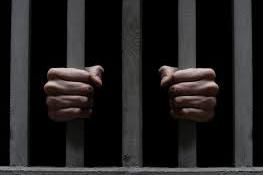Punishment or Treatment? Café Psychologique 26 May
How to deal with crime for the best.
Is it right to punish someone who was unwell at the time of their offence? A recent Louis Theroux documentary ‘By Reason of Insanity’ focussed on when treatment for mental health problems is justified instead of time spent in prison. Research has consistently shown that more than 70% of the prison population can be classified as having two or more mental health disorders. With this in mind, we would like to think about the following:
Does anyone commit a crime when they aren’t in their right mind?
Should everyone who commits a crime be given a form of treatment?
Are there any other options to the dichotomy of treatment and punishment?
Steven Mayers and Tom Matthews are Clinical Psychologists in Training and will introduce our conversation at Café Psychologique Leeds on Tuesday 26 May from 8.00 pm to 9.45 pm in Seven Arts, Chapel Allerton, Leeds. The Café costs £4 on the door.
There is a poster to download here: Café Psychologique May 2015
You can join in the conversation online on our Facebook page: Café Psychologique
Bad Religion. Café Psychologique Tuesday 28 April
Bad Religion: when is faith healthy or unhealthy?
Nice Christians, nasty Christians. Nice Muslims, nasty Muslims. Nice atheists, nasty atheists.
Perhaps it’s not the belief system that’s the problem, but the way of believing? When is a belief system unhealthy, delusional or producing so much conflict it undermines its own tenets?
This event is a joint meeting of Cafe Psychologique and Cafe Theologique and will reflect the styles and values of each.
Our specialist contributor is Dr Sara Savage. Sara is a social psychologist based in the Department of Psychology, University of Cambridge, where she has a focus on developing empirically based interventions that prevent extremism and inter-group conflict. She will introduce the conversation at Café Psychologique Leeds on Tuesday 28 April from 8.00 pm to 9.45 pm in Seven Arts, Chapel Allerton, Leeds. The Café costs £4 on the door.
Since this is a joint event between Café Psychologique and Café Theologique demand for seats is likely to be high. You can guarantee a seat by booking in advance here: Tickets
There is a poster to download here:
Café Psychologique April 2015
You can join in the conversation online on our Facebook page: Café Psychologique
Why we vote. Café Psychologique Leeds, 31 March
With a general election nearly upon us, the media seems preoccupied that there may be no party with an overall majority. However, this ignores a much bigger issue; that the proportion of people voting in British General elections has been declining since 1950 when 84% voted, to a small upturn in 2010 when 65% voted. Also, the proportion of those voting for the majority party has been declining to the point only 36% of those voting supported the party of the Prime Minister in 2010. Britain currently has a prime minister from a party supported by less than 1 in 4 (23%) of the electorate.
What difference would it make if more people voted? What is it that enables or encourages most people who can vote to do so, but a sizeable minority to not? For those who feel strongly about the next election, perhaps the single most important thing about it is to understand how to influence others to vote, and to do so in a thoughtful, considered way.
Dr Kris Dunn is a lecturer in comparative politics at the University of Leeds, with particular interest in understanding the origins of individuals’ political attitudes and behaviours, and the impact of political systems on the expression of individuals’ social and political preferences. He will introduce our conversation at Café Psychologique Leeds on Tuesday 31 March from 8.00 pm to 9.45 pm in Seven Arts, Chapel Allerton, Leeds. The Café costs £4 on the door.
There is a poster to download here: Café Psychologique March 31 2015
You can join in the conversation online on our Facebook page: Café Psychologique
Why we vote. Café Psychologique Leeds, Tuesday 31 March, 8.00 pm
With a general election nearly upon us, the media seems preoccupied that there may be no party with an overall majority. However, this ignores a much bigger issue; that the proportion of people voting in British General elections has been declining since 1950 when 84% voted, to a small upturn in 2010 when 65% voted. Also, the proportion of those voting for the majority party has been declining to the point only 36% of those voting supported the party of the Prime Minister in 2010. Britain currently has a prime minister from a party supported by less than 1 in 4 (23%) of the electorate.
What difference would it make if more people voted? What is it that enables or encourages most people who can vote to do so, but a sizeable minority to not? For those who feel strongly about the next election, perhaps the single most important thing about it is to understand how to influence others to vote, and to do so in a thoughtful, considered way.
Dr Kris Dunn is a lecturer in comparative politics at the University of Leeds, with particular interest in understanding the origins of individuals’ political attitudes and behaviours, and the impact of political systems on the expression of individuals’ social and political preferences. He will introduce our conversation at Café Psychologique Leeds on Tuesday 31 March from 8.00 pm to 9.45 pm in Seven Arts, Chapel Allerton, Leeds. The Café costs £4 on the door.
There is a poster to download here: Café Psychologique March 31 2015
You can join in the conversation online on our Facebook page: Café Psychologique
Room to Breathe Walking Group, 7 March 2015
Space to think, talk and breathe
The next Room to Breathe day is on Saturday 7 March, starting from Addingham, near Ilkley. This is a day to walk and talk in the open air of the Dales, in the company of interesting people and skilled facilitators.
Full details here or contact Chris Powell for more information.
The F Word: Is feminism a dirty word, irrelevant, or needed more than ever? Café Psychologique Leeds, 27 January
How would it feel if you were called a feminist? Is feminism still associated with the stereotypical image of being radical and/ or anti-men? For some this appears to be true. In a recent poll, 17% of women reported that calling a fellow woman a feminist was an insult, while only 12% saw the label as a compliment. In some parts of social media there has been backlash towards women promoting feminism with threats of violence and intimidation. A negative response to feminism also seems to be presented in the political arena with an anti-feminist party standing for the next general election.
How would you feel if you, or someone that you know, were described as a lady? The terms ‘woman’ and ‘lady’ are often used interchangeably. However, the word lady often comes with connotations such as, fragility, incompetency and the need for protection. Has the fight for the right to be called a woman, and all that this means, fallen to obscurity or irrelevance?
Is feminism irrelevant? In a 2014 survey of 5000 British people, only 9% of women strongly identified themselves as feminists and one in five dismissed feminism as a historical movement. This view is encapsulated in the comments of a well known actress who stated, in a recent interview, that she did not consider herself a feminist because “things are different now, I know that a lot of the work that paved the way for women happened before I was around…I was never that feminist girl, demanding equality, but maybe that’s because I’ve never really faced inequality“.
How do you feel about ongoing gender inequality? Despite views to the contrary being promoted by some, and ignorance of its need being represented in the views of others, there are ongoing calls for equality and the promotion of a contemporary feminist stance. The UN “HeforShe” campaign is trying to abolish the “us vs. them” mentality of feminism. From our perspective, inequality persists, both covertly and overtly, across our society. Moreover, globally significant challenges to equality face women. Differing perspectives on feminism may limit, or impact on, our capacity to attain equality.
Our conversation will be introduced by Elaine McMullan and Fiona Purdie, two women in the 21st Century, who are interested in these kinds of debates and believe in equality. They are also clinical psychologists.
This Café is on Tuesday 27 January from 8.00 pm to 9.45 pm in Seven Arts, Chapel Allerton, Leeds. The Café costs £3 on the door.
There is a poster to download here: Café Psychologique January 2015
You can join in the conversation online on our Facebook page: Café Psychologique
Playing the Game: what use is Sport in the Real World? Café Psychologique Tuesday 25 November
48% of adults in England play sport at least once a week and 17% do it three times weekly. If you are young and male that is much more likely to include you. However, since 90% of the UK population watched the 2012 Olympics, that probably did include you. Amazingly, just two days of cycling in Yorkshire last year brought a staggering 2.5 million people out to watch it on the route.
The question is why and what use is it? Is it just a frivolous, meaningless distraction, perhaps to avoid doing something useful or contemplating the realities of life? Dr Rob Ellis, theologian, says ‘Sport has replaced religion as a part of people’s lives’. Or are the perceived enjoyment, health and social benefits so great that even if we don’t participate we still feel drawn to watch? Or is it more to do with our tribal survival instincts, the need to band together in battle to achieve real or vicarious victory over our foes? This café will focus on whether sport has any use in our everyday lives and what that might be.
Our conversation will be introduced by Kathy Williams, a British Olympic gymnast who represented Great Britain in the Los Angeles Summer Olympic Games in 1984. She is also a qualified counsellor.
This Café is on Tuesday 25 November from 8.00 pm to 9.45 pm in Seven Arts, Chapel Allerton, Leeds. The Café costs £3 on the door.
There is a poster to download here: Café Psychologique November 2014
You can join in the conversation online on our Facebook page: Café Psychologique
Forgiveness at Café Psychologique, Tuesday 28 October
If sorry is the hardest word, why is forgiveness even harder? Some therapists take the position that the very notion of forgiveness implies a position of judgement and superiority on the part of the person offering to forgive. In the media and politics a willingness to forgive is often attacked as a sign of weakness in relation to crime, politics or even family relationships.
Yet, Desmond Tutu says ‘Forgiveness is the only way to heal the pain in my boyhood heart….Forgiveness is the best form of self-interest.’
Clinical Psychologist, Dr Ruth Sutherland, and Vicar, Revd Robb Sutherland, will initiate a conversation on what forgiveness is, why it is so hard, and whether it is necessary. This Café is on Tuesday 28 October from 8.00 pm to 9.45 pm in Seven Arts, Chapel Allerton, Leeds. The Café costs £3 on the door.
There is a poster to download here: Café Psychologique Leeds October 2014
You can join in the conversation online on our Facebook page: Café Psychologique
Fitter Faster: how High Intensity Training can break the time barrier to exercise, Café Psychologique 30 September
Regular participation in exercise is essential for maintaining life-long health and reducing the incidence and progression of chronic illnesses. So why do so many of us find it practically impossible to exercise regularly despite resolutions, gym memberships paid in advance, and the promise of weight loss and long life? It is a psychological puzzle why managing small amounts of regular exercise seems to be so spectacularly difficult to achieve for many people, despite the best efforts of doctors, personal trainers, government and even nagging partners.
One idea to change this is to do higher intensity exercise for shorter periods of time, to make it easier to fit into a busy week. A current research project at the University of Leeds is investigating walking as a way of doing High Intensity Interval Training (bouts of exercise interspersed with bouts of recovery). They are testing whether it works as well as traditional exercise regimes to provide physical benefits, and whether people are more likely to do it.
Dr Carrie Ferguson is a lecturer in Exercise Physiology at the University of Leeds, and is running the HIT Home Research Project. She will introduce the project and initiate a conversation on why people find exercise so difficult. There will also be opportunity for suitable participants to volunteer to participate in the project.
This Café is on Tuesday 30 September, from 8.00 pm to 9.45 pm (with an interval for recovery half-way through) in Seven Arts, Chapel Allerton, Leeds. The Café costs £3 on the door.
There is a poster to download here: Café Psychologique September 2014
You can join in the conversation online on our Facebook page: Café Psychologique
Room To Breathe Walking Group, 4 October 2014
Space to think, talk and breathe
The next Room to Breathe day is on Saturday 4 October, starting from Addingham, near Ilkley. This is a day to walk and talk in the open air of the Dales, in the company of interesting people and skilled facilitators.
Full details here or contact Chris Powell for more information.
Category



